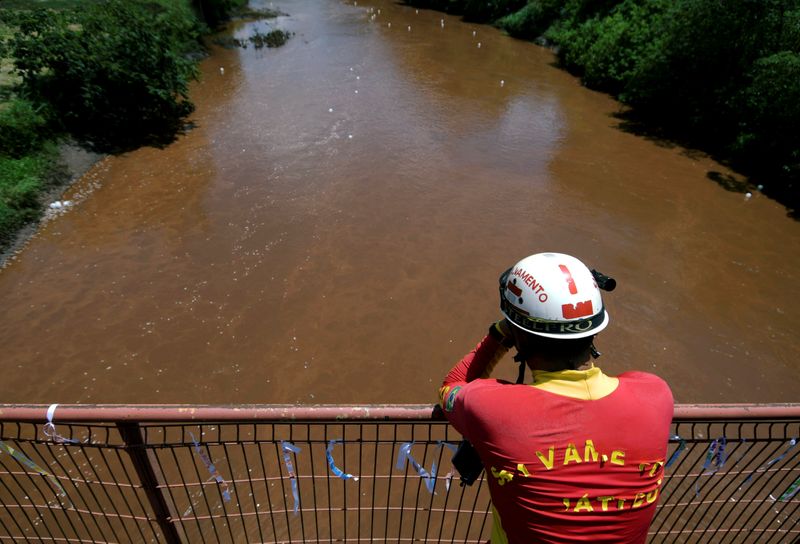This post was originally published on this site
https://i-invdn-com.akamaized.net/trkd-images/LYNXMPEG9Q0JJ_L.jpg
RIO DE JANEIRO (Reuters) – Many Brazilian investors – dazzled by iron ore miner Vale SA’s (SA:VALE3) resilient cash flow – were ready to forgive the company within months of a deadly dam disaster in 2019, piling back into its shares after an initial selloff.
But not everyone was as willing to continue as if nothing had happened.
The company’s second lethal dam disaster in three years was a formative moment for ethical investment in Brazil, where criteria based on environmental and governance concerns had long been dismissed as ideological.
“Our fund suffered a lot. Vale was by far our main position,” said Marcio Correia, stock manager at Rio de Janeiro based JGP, which in common with other fund managers suffered as the stock lost a quarter of its value within days of the dam burst.
“We realized we were overlooking the risks associated with mining, the climate issue, and we decided to take it seriously.”
In response, the 34 billion reais ($6.07 billion) asset management firm co-founded in the 1990s by Paulo Guedes, now Brazil’s economy minister, sold two thirds of its Vale share holdings.
That August, it also established its first dedicated fund guided by ESG – environmental, social and governance criteria.
Other local investors also began to realize ESG issues had major financial implications.
“The Vale disaster was game-changing in Brazil,” said Eduardo Dumans, a partner of Sao Paulo-based asset management Constellation.
By September this year, around 20 self-styled sustainable funds had lured some 1 billion reais, twice as much as 18 months earlier, the association of Brazilian financial institutions Anbima said. The country still lags the international trend.
Brazil’s three leading ESG investment firms manage less than 50 billion reais. Two of them have funds that do not exclude all polluting industries, although they use ESG data to help decide on investments.
Worldwide, funds that integrate ESG criteria managed $30 trillion when the Brumadinho dam disaster happened, figures from the Global Sustainable Investment Alliance show.
“If Vale commits to changes, it will be because of international investors, not much because of the ones in Brazil,” said Fabio Alperowitch, portfolio manager of Fama, a 2.5 billion reais firm known as a pioneer of sustainable investment in Brazil.
But he says ESG is at last catching on in Brazil.
“I see all of this with a mix of hate and love. I’ve been advocating for this for 30 years and for a long time no one could care less,” he said. “Now it has become trendy.”
SAFETY OBSESSION
Vale has taken action to try to regain trust.
“Safety has become an obsession, and the company believes that the integration of ESG in our routine will be essential for Vale’s de-risking,” it said in a written response to questions from Reuters.
It has set aside 18.6 billion reais for cleaning up and restoring the environment and to compensate victims following the 2019 dam burst. So far, it has spent more than 10 billion reais of the sum.
Its efforts to address ESG issues helped to persuade ratings agency Moody’s (NYSE:MCO) to restore Vale’s investment grade rating on Oct. 1.
Still Vale has the lowest company valuation multiple among the top global miners, based on its enterprise value to earnings before interest, tax, depreciation and amortization (EBITDA) ratio, a commonly-used metric.
JGP and other ethically-focused Brazilian funds say Vale’s reduced value reflects continued investor doubts about its ability to meet ESG targets without compromising production.
Restoring its reputation is particularly hard in that the Brumadinho collapse in January 2019, which killed 270 people, occurred only just over three years after another dam burst at Samarco in Nov. 2015 that left 19 dead in Brazil’s worst environmental disaster.
JGP has ruled out any Vale share purchases until August 2021 – which would mark two years since the creation of its dedicated ESG fund.
Correia said the ban could be extended unless Vale convinces investors of its commitment to good practice and to measures to prevent new accidents, protect the environment and improve its behavior when mining in indigenous lands.
Responding to Reuters’ questions, Vale said its safety measures included reducing its use of dams that store mining waste known as tailings in favor of safer dry stacking.
In addition, it said 20% of long-term compensation targets for its senior management will be based on ESG performance without giving a specific timeframe.
But Dumans at Constellation, which has 13 billion reais under management and includes Brazilian billionaire Jorge Paulo Lemann among its minority stakeholders, said he would not consider Vale.
ESG aside, he said Constellation avoids volatile asset classes such as metals.
But without risk, there is no reward. Iron ore prices hit a six-year high in mid-September making major iron ore producer Vale appear a bargain.
“The tricky thing is that Vale is cheap compared to its peers so it attracts investors,” Correia said.


